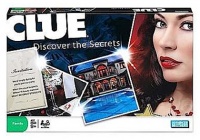 Rolling for Initiative is a weekly column by Scott Thorne, PhD, owner of Castle Perilous Games & Books in Carbondale, Illinois. This week, Thorne explains why people don’t see what they’re not looking for.
Rolling for Initiative is a weekly column by Scott Thorne, PhD, owner of Castle Perilous Games & Books in Carbondale, Illinois. This week, Thorne explains why people don’t see what they’re not looking for.I’ve been noticing recently the propensity of people to walk right by things that, by all rights, they should take quite an interest in.
This especially struck home yesterday when I had a customer come in looking for copies of Clue, Kill Dr. Lucky and Save Dr. Lucky. We were out of Clue and she had the impression that the Dr. Lucky games played similar to Clue. After explaining they did not play like Clue and going over basic game play a bit, I apologized for the Clue out of stock and pointed out Days of Wonder’s Mystery of the Abbey, which plays very similarly to Clue and which she had walked right past. Ultimately, she purchased Save Dr. Lucky and said she would come back later in the week when we restocked Clue. Still, however, this wound up a perfect example of people ignoring things you would think they would notice.
Another example of this happened not less than five minutes ago. The store is sponsoring a gaming convention at the local civic center next weekend (Egypt Wars 2, if you’re interested in attending). We have done newspaper advertising, television, Internet, Facebook, even plastered flyers on bulletin boards around town. We’ve also posted flyers up on the store bulletin board, noted it on the store calendar and have a poster on the front door. Pre-registration closes for the event today and so far, everyone I have mentioned it to has expressed surprise and a “Cool, I had no idea this was going on” response. While I appreciate the interest, it is still rather dispiriting to find that the advertising hadn’t reached the very market we are targeting, even the in-store advertising.
In both cases, what is going on is what consumer behaviorists call “selective perception.” This is the tendency of people to not notice things that they are not interested in at the moment. The customer looking for Clue focused on that game so ignored Mystery at the Abby, since it was not Clue pre se. The people who didn’t know about the gaming convention in town came into the store focused on Magic: The Gathering and Dungeons & Dragons, not a gaming convention. Once pointed out, they got interested in the convention, flipped through the pre-registration packet and took one with them. Hopefully, we will see them next weekend.
An example I like to cite to my classes is billboards. When driving along the interstate, you drive by dozens of billboards, ignoring 99% of them, until your fuel gauge starts getting really close to empty. Now you get engaged in thoughts of “Ohmigosh, I need to refill the tank” and start paying attention to those billboards you ignored moments before, looking for the next gas station. Once you fill up, billboards, even ones for gas stations, become part of the landscape again.
The same thing happens with our stores. People come in, focused on a particular item, whether Magic, Pathfinder or Settlers of Catan, and walk past the dozens, nay hundreds of different items we stock. Our job, then, is to interact with those people, help them to find the items they came in looking for and expand their perceptions to other products beyond that which they originally sought.
The opinions expressed in this column are solely those of the writer, and do not necessarily reflect the views of the editorial staff of ICv2.com.


